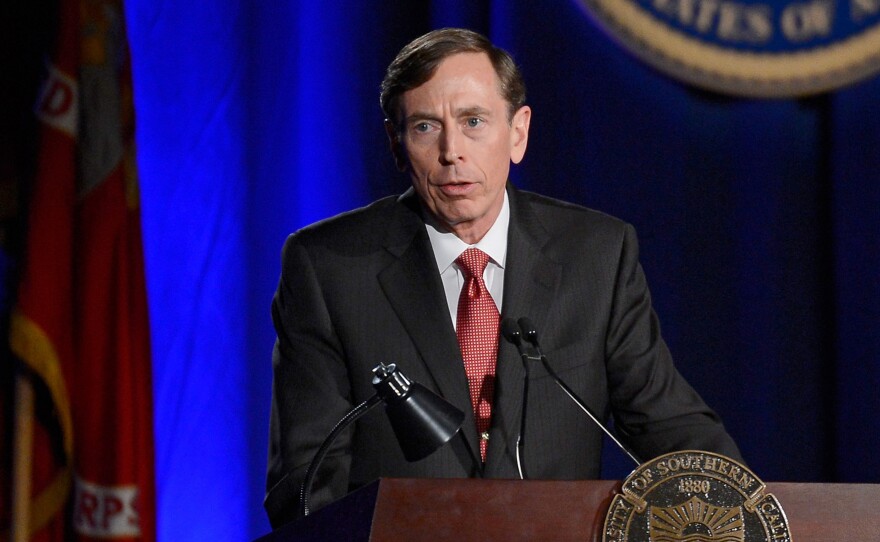Former CIA Director David Petraeus is under renewed scrutiny over the role he played in creating the discredited "talking points" about the attack that killed four Americans last year in Benghazi, Libya. The Washington Post has a front-page story Wednesday that suggests Petraeus sought to shape the resulting memo to favor his agency.
In the days immediately after the violence on Sept. 11, 2012, members of the Obama administration said or suggested the attack was a protest that spiraled out of control. But the assault that killed Ambassador J. Christopher Stevens and three other Americans at the diplomatic outpost in Benghazi is now seen as a terrorist attack.
The Post's story follows the White House's release last week of 100 pages of emails that were written within days of the attack.
Those emails were part of an effort to supply unclassified information to help members of a House intelligence panel speak publicly about the attack without giving away secret information. As NPR's Scott Horsley reported last week, "the first batch of emails in this collection is all from people inside the CIA working to put together the talking points."
The emails revealed the complicated process that produced talking points about the attack, and as Scott said of the intelligence agency, "their very first draft contains the seeds of the mistake that continues to haunt the administration. The director of terrorism analysis at the CIA wrote: 'We believe based on currently available information that the attacks in Benghazi were spontaneously inspired by the protest at the U.S. embassy in Cairo and evolved into a direct assault against the U.S. consulate.'"
That contention, repeated on Sunday interview shows by U.N. Ambassador Susan Rice, has been proven wrong. The resulting controversy has pitted members of Congress against the White House and suggested rivalries between federal entities including the CIA, the FBI, and the State Department.
And it seems the CIA had its own complicated internal debate over the talking points, with the agency's director at the time, Petraeus, playing a key role in shaping the document, according to The Post.
Petraeus sought to go "well beyond the committee's request, apparently to produce a set of talking points favorable to his image and his agency," The Post reports. The newspaper adds that the director's requests to add certain elements to the memo met with resistance from other top CIA officials.
The man who asked for the talking points in the first place, Democratic Rep. Dutch Ruppersberger of Md., says his only goal was to help members of the House Permanent Select Committee on Intelligence, especially those new to the panel, avoid giving away information about the investigation or clandestine activities.
"We had some new members on the committee, and we knew the press would be very aggressive on this, so we didn't want any of them to make mistakes," Ruppersberger tells The Post.
But the request took on great importance and highlighted divisions within agencies over how to portray that attacks. When it emerged from the CIA for review, the draft memo contained two elements that troubled the State Department, as Scott reported last week:
"A spokeswoman there, Victoria Nuland, was worried about the reference to another Islamic extremist group, Ansar al-Sharia, because the State Department itself had been careful not to identify perpetrators or possible perpetrators while the investigation was underway."
That reference, added at Petraeus' request, also rankled the FBI, which was investigating the attack. And it unsettled the CIA's general counsel, Stephen W. Preston, who wrote an email reminding his agency colleagues that naming possible suspects was not allowed during an ongoing criminal investigation.
It became "the chief source of tension" between the three U.S. entities, The Post says.
Another problem, the newspaper reports, was that the draft memo mentioned earlier CIA warnings regarding events in Cairo and precautions ahead of the anniversary of the Sept. 11, 2001, terrorist attacks -- elements that seem to have been added at Petraeus' request.
Nuland "complained that a reference to CIA warnings could make it appear the State Department hadn't been paying attention," Scott said. "And so, by Saturday afternoon, those items had been dropped from the talking points."
Eventually, CIA Deputy Director Mike Morell reduced the talking points to three main items, The Post says. But the simplified version prompted concerns within the CIA that Petraeus would not sign off on the revisions. And an email quoted by the newspaper shows that some within the agency warned that the House panel that requested the information would not be satisfied with the talking points.
"They are fine with me. But, pretty sure [the House committee] won't like them," the CIA terrorism analysis director responded, according to the story, which notes that he ended his email with an emoticon of a smiling face.
Petraeus was less positive, saying he'd rather not use the memo as written. He added that it wouldn't satisfy Ruppersberger.
But that statement puzzles Ruppersberger, according to The Post, which quotes him as saying, "I'm not sure what he meant. I had no expectations."
The Post's feature, published Tuesday evening, includes copies of 100 pages of emails, along with annotations.
Copyright 2013 NPR. To see more, visit www.npr.org.






